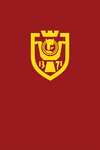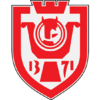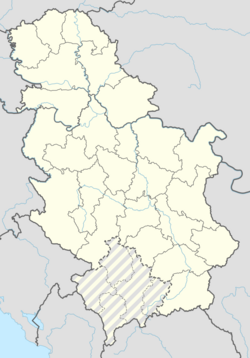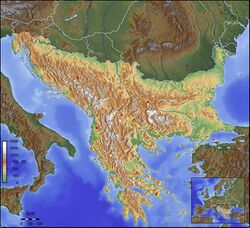Place:Kruševac
Kruševac Крушевац (Serbian) | |
|---|---|
City | |
| City of Kruševac | |
|
From top: Panorama of Kruševac, Town Hall, Slobodište Memorial Complex, Lazar Hrebeljanović's statue, The Kosovo Heroes monument, Lazarica Church, Kruševac Fortress | |
| Coordinates: [ ⚑ ] : 43°34′50″N 21°19′50″E / 43.58056°N 21.33056°E | |
| Country | |
| Region | Šumadija and Western Serbia |
| District | Rasina |
| Founded | 1371 |
| Founded by | Lazar of Serbia |
| Settlements | 101 |
| Government | |
| • Mayor | Jasmina Palurović (SNS) |
| Area | |
| Area rank | 20th in Serbia |
| • Urban | 18 km2 (7 sq mi) |
| • Administrative | 854 km2 (330 sq mi) |
| Elevation | 163 m (535 ft) |
| Population (2022 census)[2] | |
| • Rank | 8th in Serbia |
| • Urban | 68,119 |
| • Urban density | 3,800/km2 (9,800/sq mi) |
| • Administrative | 113,582 |
| • Administrative density | 130/km2 (340/sq mi) |
| Time zone | UTC+1 (CET) |
| • Summer (DST) | UTC+2 (CEST) |
| Postal code | 37000 |
| Area code | +381(0)37 |
| Car plates | KŠ |
| Website | www |
Kruševac (Serbian Cyrillic: Крушевац, pronounced [krûʃeʋats] (![]() listen)) is a city and the administrative center of the Rasina District in central Serbia. It is located in the valley of West Morava, on Rasina river. According to the 2022 census, the city administrative area has a population of 113,582 while the urban area has 68,119 inhabitants.
listen)) is a city and the administrative center of the Rasina District in central Serbia. It is located in the valley of West Morava, on Rasina river. According to the 2022 census, the city administrative area has a population of 113,582 while the urban area has 68,119 inhabitants.
The city was founded in 1371, by Prince Lazar of Serbia (1371–1389), who used it as his seat.
Etymology
The etymology is derived from the Serbian word for "river stone", krušac which was largely used for a building at that time.
History
Kruševac was founded in 1371, as a fortified town in the possession of Lord Lazar Hrebeljanović. The Lazarica Church (or Church of St, Stephen) was built by Lazar between 1375–78, in the Morava architectural style.[3] It is mentioned in one of Lazar's edicts in 1387, as his seat, when he affirmed the rights of Venetian merchants on Serbian territory. In preparation for the Battle of Kosovo (1389) against the Ottoman Empire, the Serbian army assembled in the city. The site of Lazar's palace is marked by a ruined enclosure containing a fragment of the tower of his spouse Princess Milica, and, according to legend, tidings of the defeat were brought to her by crows from the battlefield. After the battle, the city was held by Princess Milica as her seat. The little that remains of Lazar's city is the Kruševac Fortress, which was declared a Cultural Monument of Exceptional Importance in 1979.[4] Several old Ottoman houses were left at the beginning of the 20th century, besides an old Turkish fountain and bath, which was known as Alacahisar (Aladža Hisar) during Ottoman rule between 1427–1833 (nominally to 1867) when Kruševac was the seat of the Sanjak of Kruševac. The Ottoman rule was interrupted during Austrian occupations between 1688–1690 and 1717–1739.[citation needed]
A large monument dedicated to Serbs fallen at the Battle of Kosovo was sculpted by Đorđe Jovanović and unveiled by King Petar I Karađorđević of Serbia in 1904. A detail on the monument, among others, is a statue of the famous blind Serbian poet Filip Višnjić.
At the beginning of the German occupation of Yugoslavia the units of Yugoslav Army in the Fatherland commanded by Dragutin Keserović and supported by one detachment of communists attacked the German garrison in September 1941 but failed to liberate the town after four days battle. During World War II mass executions of patriots and antifascists occurred on hill Bagdala. Largest execution was in summer of 1943. At place of executions now is a monument named Slobodište (from the Serbian word "sloboda", which means 'freedom'). Kruševac was liberated on 14 October when chetnik collaborators and Germans left the city together. After the regime of communists in Serbia ended the Government of Serbia and its Ministry of Justice established the commission to research atrocities that were committed by members of the Yugoslav Partisan Movement after they gained control over Serbia in Autumn 1944. According to the report of this commission, out of 55,554 registered victims of communist purges in Serbia the new communist regime in Kruševac killed 493 people while 11 people are missing.[5]
Kruševac progressed profusely during the SFRY. A large number of factories were built in that era, while Kruševac became one of the strongest industrial centres in both Serbia and Yugoslavia. The machine factory IMK 14. oktobar Kruševac employed around 7,000 workers.
However, the large Kruševac industry hasn't survived the post-Milošević transition. In 2002 alone 5 factories went bankrupt.[6][unreliable source?] From 2002 to 2014 27 factories closed and around 11,000 workers lost their jobs.[7] The unemployment rate in Kruševac was almost 39% in 2015.[8][unreliable source]
Settlements
Aside from the urban area of Kruševac, the city administrative area includes the following 100 settlements:
- Bošnjanе
- Begovo Brdo
- Bela Voda
- Belasica
- Bivolje
- Bovan
- Bojince
- Boljevac
- Brajkovac
- Bukovica
- Buci
- Velika Kruševica
- Velika Lomnica
- Veliki Kupci
- Veliki Šiljegovac
- Veliko Golovode
- Veliko Krušince
- Vitanovac
- Vratare
- Vučak
- Gavez
- Gaglovo
- Gari
- Globare
- Globoder
- Gornji Stepoš
- Grevci
- Grkljane
- Dvorane
- Dedina
- Dobromir
- Doljane
- Donji Stepoš
- Đunis
- Žabare
- Zdravinje
- Zebica
- Zubovac
- Jablanica
- Jasika
- Jošje
- Kamenare
- Kaonik
- Kapidžija
- Kobilje
- Komorane
- Konjuh
- Koševi
- Krvavica
- Kukljin
- Lazarevac
- Lazarica
- Lipovac
- Lovci
- Lukavac
- Ljubava
- Majdevo
- Makrešane
- Mala Vrbnica
- Mala Reka
- Mali Kupci
- Mali Šiljegovac
- Malo Golovode
- Malo Krušince
- Mačkovac
- Meševo
- Modrica
- Mudrakovac
- Naupare
- Padež
- Pakašnica
- Parunovac
- Pasjak
- Pepeljevac
- Petina
- Pozlata
- Poljaci
- Ribare
- Ribarska Banja
- Rlica
- Rosica
- Sebečevac
- Sezemče
- Slatina
- Srndalje
- Srnje
- Stanci
- Suvaja
- Sušica
- Tekija
- Trebotin
- Trmčare
- Ćelije
- Cerova
- Crkvina
- Čitluk
- Šavrane
- Šanac
- Šašilovac
- Šogolj
- Štitare
Demographics
| Historical population | ||
|---|---|---|
| Year | Pop. | ±% p.a. |
| 1948 | 87,853 | — |
| 1953 | 94,827 | +1.54% |
| 1961 | 103,190 | +1.06% |
| 1971 | 118,016 | +1.35% |
| 1981 | 132,972 | +1.20% |
| 1991 | 138,111 | +0.38% |
| 2002 | 131,368 | −0.45% |
| 2011 | 128,752 | −0.22% |
| Source: [9] | ||
According to the 2011 census results, the city of Kruševac has a total population of 128,752 inhabitants.
Ethnic groups
The ethnic composition of the city administrative area:[10]
| Ethnic group | Population | % |
|---|---|---|
| Serbs | 122,529 | 95.17% |
| Roma | 2,461 | 1.91% |
| Montenegrins | 282 | 0.22% |
| Macedonians | 200 | 0.16% |
| Croats | 107 | 0.08% |
| Yugoslavs | 86 | 0.07% |
| Total | 128,752 |
Economy
The most notable large companies based in the city of Kruševac are: Trayal Corporation, 14. oktobar, Rubin and Cooper Tire & Rubber Company Serbia. As of September 2017, Kruševac has one of 14 free economic zones established in Serbia.[11]
The following table gives a preview of total number of registered people employed in legal entities per their core activity (as of 2019):[12]
| Activity | Total |
|---|---|
| Agriculture, forestry and fishing | 369 |
| Mining and quarrying | 42 |
| Manufacturing | 8,519 |
| Electricity, gas, steam and air conditioning supply | 514 |
| Water supply; sewerage, waste management and remediation activities | 652 |
| Construction | 2,007 |
| Wholesale and retail trade, repair of motor vehicles and motorcycles | 5,150 |
| Transportation and storage | 1,387 |
| Accommodation and food services | 1,093 |
| Information and communication | 362 |
| Financial and insurance activities | 560 |
| Real estate activities | 210 |
| Professional, scientific and technical activities | 1,076 |
| Administrative and support service activities | 572 |
| Public administration and defense; compulsory social security | 1,784 |
| Education | 2,221 |
| Human health and social work activities | 2,877 |
| Arts, entertainment and recreation | 642 |
| Other service activities | 567 |
| Individual agricultural workers | 1,941 |
| Total | 32,547 |
Politics
Seats in the city parliament won in the 2016 local elections:
| Party | Seats |
|---|---|
| Serbian Progressive Party | 53 |
| Socialist Party of Serbia | 8 |
| Democratic Party | 4 |
| United Serbia | 4 |
| Independent MP | 1 |
Sports
The city's main football club is FK Napredak Kruševac, who regularly play in the Serbian SuperLiga.
Climate
Script error: No such module "weather box".
Famous residents
- Stefan Lazarević (1377–1427), medieval ruler of Serbia
- Stojan Protić (1857–1923), Prime Minister of the Kingdom of Serbs, Croats and Slovenes 1918–1919, 1920
- Ljubinka Bobić (1897–1978), Serbian actress
- Stanislav Binički (1872–1942), Serbian composer (Marš na Drinu)
- Dobrica Ćosić (1921–2014), Serbian writer, first President of FR Yugoslavia
- Taško Načić (1934–1993), Serbian actor
- Miodrag Petrović Čkalja (1924–2003), One of the most popular Serbian comedians
- Bata Paskaljević (1923–2004), Serbian actor
- Radmila Savićević (1926–2001), Serbian actress
- Ljiljana Jovanović (1930–2012), Serbian actress
- America Alonso (1936–2022) Venezuelan actress
- Miroslav Mišković (b. 1945), Serbian businessman
- Dragiša Binić (b. 1961), Serbian footballer, 1990–91 European Cup winner
- Milić Jovanović (b. 1966), Serbian footballer, 1990–91 European Cup winner
- Ognjen Petrović (1948–2000), Serbian footballer
- Nebojša Bradić (b. 1956), Serbian theatre director, and former Minister of Culture
- Goran Grbović (b. 1961), Serbian basketball player, bronze medalist at the EuroBasket 1987
- Vojin Ćetković (b. 1971), Serbian actor
- Marko Živić (1972–2021), Serbian actor
- Bojan Lazić (b. 1974), professional Serbian football player
- Nataša Tapušković (b. 1975), Serbian actress
- Branislav Trifunović (b. 1978), Serbian actor
- Bojan Zajić (b. 1980), Serbian footballer
- Aleksandar Mitrović (b. 1982), Serbian volleyball player
- Predrag Pavlović (b. 1986), Serbian footballer
- Milan Gajić (b. 1986), Serbian footballer
- Nikola Milošević (b. 1993), Serbian footballer
- Predrag Jovanović (b. 1950), Serbian musician
- Dragan Milosavljević (b. 1989), Serbian basketball player, silver medalist at the EuroBasket 2017
- Milica Todorović (born 1990), Serbian singer
- Sanja Vučić (born 1993), Serbian singer who represented Serbia in the Eurovision Song Contest 2016 and the Eurovision Song Contest 2021
- Ognjen Jaramaz (b. 1995), Serbian basketball player
- Tijana Bogdanović (b. 1998), Serbian taekwondo practitioner, European champion and silver medalist at the 2016 Summer Olympics
- Mimica Pavlović (b. 1984) Serbian footballer
International relations
Twin towns – Sister cities
Kruševac is twinned with:
|
Other forms of co-operation and city friendship similar to the twin/sister city programmes:
Gallery
-
Women selling poultry at the market, 1913
-
Belfry
-
Middle Ages era ruins in Kruševac
-
Lazar Hrebeljanović's statue in Kruševac
-
Filip Višnjić's statue in Kruševac
-
Kneginja Milica's statue
-
The Kosovo Heroes Square
-
The Kosovo Heroes Square
-
Kruševac panorama
-
Town hall
-
Gymnasium and the city museum
-
Main train station in the town
See also
- List of cities in Serbia
- Rubin (company)
References
- ↑ Template:Serbian municipalities 2006
- ↑ Template:Serbian census 2022
- ↑ Filip Jovanovic i Djordje Banovic. "Istorija – Crkva Lazarica – Kruševac – Srpska Pravoslavna Crkva". Lazarica.rs. http://www.lazarica.rs/Istorija.htm.
- ↑ Monuments of Culture in Serbia: ЦРКВА СВ.СТЕФАНА ЛАЗАРИЦА СА КРУШЕВАЧКИМ ГРАДОМ (SANU) (in Serbian and English)
- ↑ "Registar Žrtava". Ministry of Justice, Republic of Serbia. http://otvorenaknjiga.komisija1944.mpravde.gov.rs/cr/#00.
- ↑ "Svi naši porazi - većina kruševačkih restrukturaša završila u stečaju". 28 January 2016. http://krusevacgrad.rs/svi-nasi-porazi-vecina-krusevackih-restrukturasa-zavrsila-u-stecaju/.
- ↑ "Svi naši porazi - većina kruševačkih restrukturaša završila u stečaju". 28 January 2016. http://krusevacgrad.rs/svi-nasi-porazi-vecina-krusevackih-restrukturasa-zavrsila-u-stecaju/.
- ↑ "Pajtić: Kruševac dotakao dno za vreme vlasti SNS". http://www.blic.rs/vesti/politika/pajtic-krusevac-dotakao-dno-za-vreme-vlasti-sns/ed111nx.
- ↑ "2011 Census of Population, Households and Dwellings in the Republic of Serbia". Statistical Office of the Republic of Serbia. http://pod2.stat.gov.rs/ObjavljenePublikacije/Popis2011/Knjiga20.pdf.
- ↑ "ETHNICITY Data by municipalities and cities". Statistical Office of the Republic of Serbia. http://pod2.stat.gov.rs/ObjavljenePublikacije/Popis2011/Nacionalna%20pripadnost-Ethnicity.pdf.
- ↑ Mikavica, A. (3 September 2017). "Slobodne zone mamac za investitore" (in sr). politika.rs. http://www.politika.rs/sr/clanak/388105/Slobodne-zone-mamac-za-investitore.
- ↑ "Запослени у Републици Србији, 2019. - Годишњи просек -" (in sr). Statistical Office of Republic of Serbia. 31 January 2020. https://publikacije.stat.gov.rs/G2020/Pdf/G20201018.pdf.
- ↑ "Monthly and annual means, maximum and minimum values of meteorological elements for the period 1991–2020" (in sr). Republic Hydrometeorological Service of Serbia. https://www.hidmet.gov.rs/ciril/meteorologija/stanica_sr_krusevac.php.
- ↑ "Monthly and annual means, maximum and minimum values of meteorological elements for the period 1981 - 2010" (in sr). Republic Hydrometeorological Service of Serbia. http://www.hidmet.gov.rs/eng/meteorologija/stanica_sr.php?moss_id=13383.
- ↑ "AllCorfu.Com: Corfu's Twin Cities". allcorfu.com. http://www.allcorfu.com/in-trivia.html.
External links
- krusevac.link portal
- 037info Kruševac portal
- KruševacPRESS portal
- Kruševac Parliament portal
- Kruševac Info portal
 |






















